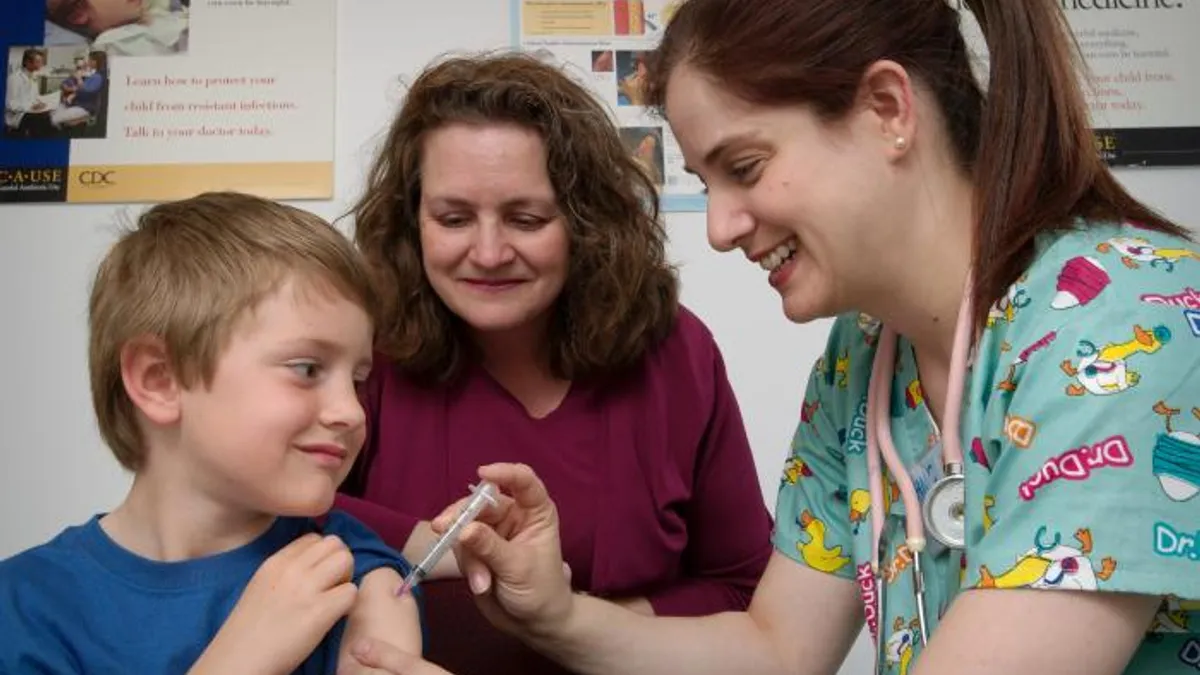Dive Brief:
- Though public health officials declared in 2000 that measles had been eradicated, 206 cases have been confirmed in 11 states during January and February, according to the U.S. Centers for Disease Control and Prevention (CDC). Public health officials have spent more than $1 million trying to contain the illness, and legislators in multiple states — including Washington, Colorado and Oregon — are moving to close loopholes that allow families to opt out of getting vaccinated, Education Week reports.
- In Washington state, in light of a measles outbreak that hit at least 70 students — 61 of whom weren't vaccinated — in one county alone has declared a state of emergency, and hundreds more unvaccinated students were sent home for weeks to avoid exposure, Education Week notes. Only 88.6% of the state's students are fully vaccinated.
- Meanwhile, the debate is being played out on the national stage, with those in favor of vaccinations arguing they are safe, economically beneficial and can prevent community outbreaks, while some opponents argue the risks of vaccinations have not been fully explored and that government agencies should not be able to mandate medical decisions.
Dive Insight:
The anti-vaccination movement is taking heat amid the current measles outbreak, which has struck some areas of the United States and the Philippines. The World Health Organization has declared the movement as “one of the top 10 global health threats for 2019." The anti-vaccination movement has also taken blame for similar disease outbreaks in 2013 and 2015; however, there have also been confirmed reports of measles outbreaks in the past in schools that, in at least one case, had vaccination compliance levels as high as 98%.
However, the anti-vaccination movement is still very much present as the debate has transcended to areas including education, health care and political circles. Though concerns about a supposed link between vaccinations and autism may have fueled the debate in recent years, vaccinations have long been a concern to some parents, either because they fear the unknown effects, were presented with inaccurate information, maintain religious beliefs against these practices or feel the risks of outweigh the benefits.
According to the Health Resources and Services Administration, the federal government, during the lifetime of the National Vaccine Injury Compensation Program, has awarded roughly $4 billion in compensation to parents whose children were injured by vaccines. Between 2006 and 2017, 6,197 petitions made it to the vaccination court and 4,250 were compensated. Though the CDC points out that these cases represent only one per 1 million doses of vaccine distributed, no parent wants his or her child to be the one affected. Additionally, some argue a lack of accurate records reflecting other adverse reactions to vaccines has caused skepticism.
There is research that proves vaccines can help prevent the spread of serious communicable diseases. When state lawmakers examine the issue, it's important for them to consider which decision benefits the most people, as well as what the potential effects of such a decision might be. Additionally, state laws concerning required vaccinations for public schools and allowed exemptions vary widely. As the vaccination debate reaches a fever pitch during the most recent outbreak, at least 20 states have fronted bills this year to expand vaccination exemption rights.
School leaders have little control over legislative decisions but are left to deal with the fallout. As the specter of an outbreak continues, these officials can consider how they would handle an outbreak in their community and how they can keep students learning — even if they have to remain at home. They can also expand vaccination education campaigns for parents. At the end of the day, treating parents and community members with respect as you share information — regardless of where they might stand in the debate — will spark more productive conversations.







 Dive Awards
Dive Awards






